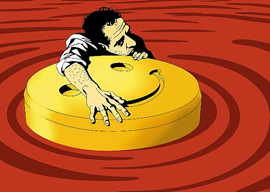
April 19, 2012

Later writers put even narrower bounds on happiness. Here is Boswell on Johnson:
Being pressed upon this subject, and asked if he really was of opinion, that though, in general, happiness was very rare in human life, a man was not sometimes happy in the moment that was present, he answered, “Never, but when he is drunk.”
Jane Austen may have had this in mind when she observed:
Perfect happiness, even in memory, is not common.
This is too stern for me. I feel sure I have been happy quite often, and while sober, too: mountain hiking on a fresh, bright morning; at ease among old friends; in love’s embraces; among my family on quiet snowbound winter evenings; at the completion of some difficult task or the solution of some knotty problem; or in a festive crowd of strangers celebrating some common triumph or joy. Not much of everyday life rises to the level of positive happiness, but some of it does.
The issue is further confused in the English language (and the Greek, too, if my dictionary-flipping struggles with the original of that Herodotus are any guide”oh, and come to think of it, also in Chinese“I guess it’s universal) by a confusion between happiness as an inner state, a glow of positive emotion, and luck. The Middle English root, happe, is all about luck, chance, or fortune, according to the OED. That is why it shows up in “perhaps” and “happen.” That is also the sense in Thomas Hardy’s bitter, gloomy poem “Hap“:
…How arrives it joy lies slain,
And why unblooms the best hope ever sown?
“Crass Casualty obstructs the sun and rain,
And dicing Time for gladness casts a moan…
These purblind Doomsters had as readily strown
Blisses about my pilgrimage as pain.
Can one be happy without some measure of luck? Solon and Thomas Hardy plainly thought not. Again, I beg to differ. For the cussed, dogged portion of humanity at least, there is a satisfaction in defying bad luck and staring down Hardy’s “purblind Doomsters.”
Having opened with a de Gaulle anecdote, I”ll close with one.
The de Gaulles had a daughter, Anne, afflicted with Down syndrome. De Gaulle adored her, but as often happens in such cases, Anne died young. At her graveside when the service was over, de Gaulle turned to his wife and said: “Come. Now she is like the others.”
(Note: Concerning the flap over my April 5 Taki’s Mag column, I have nothing more to say that will fit into the normal format. Such occasional things as I do have to say I am putting on an ad hoc Web page on my own website, with a link from my home page. We now resume our scheduled programming.)